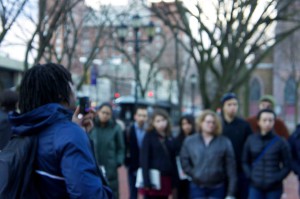 On January 20, a crowd of about 30 people gathered in downtown New Haven to honor the radical legacy of Dr. Martin Luther King, Jr. and protest recent developments in New Haven’s policing strategies.
On January 20, a crowd of about 30 people gathered in downtown New Haven to honor the radical legacy of Dr. Martin Luther King, Jr. and protest recent developments in New Haven’s policing strategies.
New Haven is implementing an intense form of policing known as “the Surge”, modeled after New York’s “Stop and Frisk” program. The Surge targets Black and Brown youth, poor and homeless people and any other “undesirable” individuals in the ultra-gentrified downtown area as well as working-class neighborhoods. The tactic consists of multiple police officers being concentrated in target areas to stop, harass and often arrest the targeted people. People can be stopped for standing at a bus stop, spending time with friends outside after dark and riding bikes.
The rally, called by the Connecticut branch of the ANSWER Coalition, was attended and supported by many Yale students. Speakers called on the students to fight against Yale’s gentrification of New Haven from the inside. Karléh Wilson, a student, had put together and is circulating a petition to end the Surge. Wilson spoke about the petition and the importance of keeping pressure on the board of Aldermen and other city politicians, who claim to support progressive reforms in policing.
ANSWER has begun circulating pocket-sized Know Your Rights booklets in English and Spanish to New Haven residents. The booklets inform the community about their rights when dealing with police and how to film officers and document misconduct. The booklets were wildly popular at the rally, with nearly 400 handed out to attendees and passers-by.
Trevor Carty, a young sales representative and New Haven resident, stopped by the rally and agreed strongly with its message. Carty and his friends have frequently been targeted by the Surge while hanging out downtown. “They try to shoo everybody off,” he said. “Not everybody wants to shoot each other.”
Speakers at the rally spoke about a wide range of issues related to policing and discrimination in criminal justice. Representatives from the Native and transgender communities spoke about the dire need for solidarity. “If you are LGBT, you need to stand in solidarity with the Black and Brown community. Because you know who won us our rights? Trans women of color, who led the Stonewall riots against the police,” said Al Riccio, an ANSWER organizer and prominent trans rights activist.
Unsurprisingly, police circled the action. Surprisingly, a comment was made by a police officer to a local media outlet regarding the Surge: “We’re certainly not going to call it the Surge anymore.” While it is clear that the police are not intending to change their methods, the community pressure has been successful in shaming the New Haven police department.





